Vladislav Martynov (Ethereum) and Ilya Yashin (World Wi-Fi) on “Sharing economy” prospects
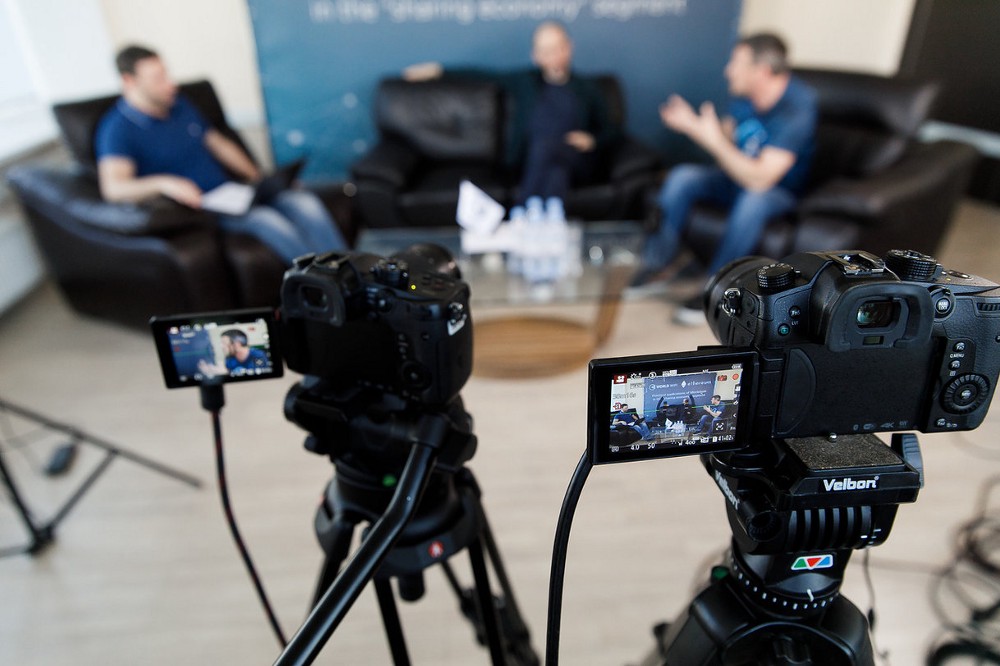
Our team is always happy to talk to its community. This week, we organized a live stream session with a very special guest – Vladislav Martynov, Ethereum Foundation advisor, and Ilya Yashin, CEO of World Wi-Fi, along with World Wi-Fi’s advisor Dmitry Dain as a moderator. Below is a brief summary of topics discussed.
Dmitry Dain: Let’s take a look at sharing economy in general. We know Uber, Airbnb and others are certainly big successful companies, but is the real value there done? Is there growth left? And what role does blockchain play in the whole ecosystem?
Vladislav Martynov: Obviously sharing economy is growing and has great potential for the simple reason that it’s more efficient, more economic and more attractive to customers due to a relatively low cost of services. It is becoming a revolutionary trend in the way people consume services, particularly concerning internet development and adoption. Sharing economy has a great potential to grow big in a short period of time, within a couple of years, especially with the help of blockchain and artificial intelligence. I’m personally excited about this.
Ilya Yashin: You talked about sharing economy as a business for companies. What do you think about sharing economy as a sharing business? E.g. decentralized Facebook or Airbnb. Is it possible to make management of any business or company on blockchain?
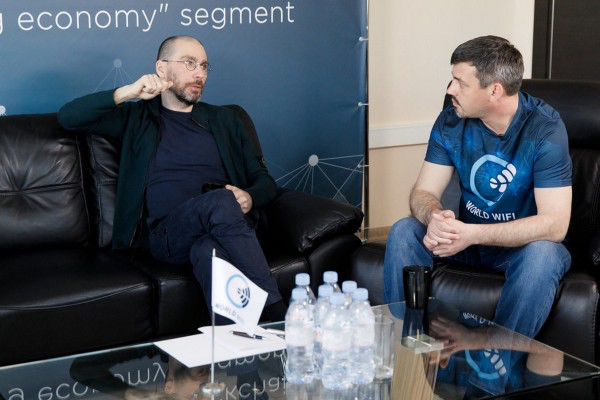
Vladislav Martynov: When I talked about sharing economy, I meant it in a much broader term, including decentralization in social networks and many other things. But let’s talk a bit about social networks. Decentralizing business management is not just possible, it’s a must. Currently on social media we don’t capitalize on the data we provide to the service provider.
For instance, I feed Facebook with tons of data about my behaviour, my friends, my preferences, which Facebook sells to third parties for a huge amount of money and I get nothing in return. Decentralization of social networks will make the world much more fair and effective from the economical point of view and will shift the power back to customers, the ownership of my data back to me. Another thing is that we have tons of devices and computing equipment that are under-utilized. So if we take your example, there are Wi-Fi routers and other computing devices that are only used for 5–10% of their capacity. Just think if you could take this computing power back to the network via a very structured, secure and decentralized way to store data, process certain applications, etc.
From the economical point of view this could hugely improve the way we utilise our devices, as well as generate additional revenue stream from pretty much any asset we have. People that can create value will get the highest reward, because there will be no intermediate. It’s an interesting dynamic to watch, I believe we live in a very interesting time.
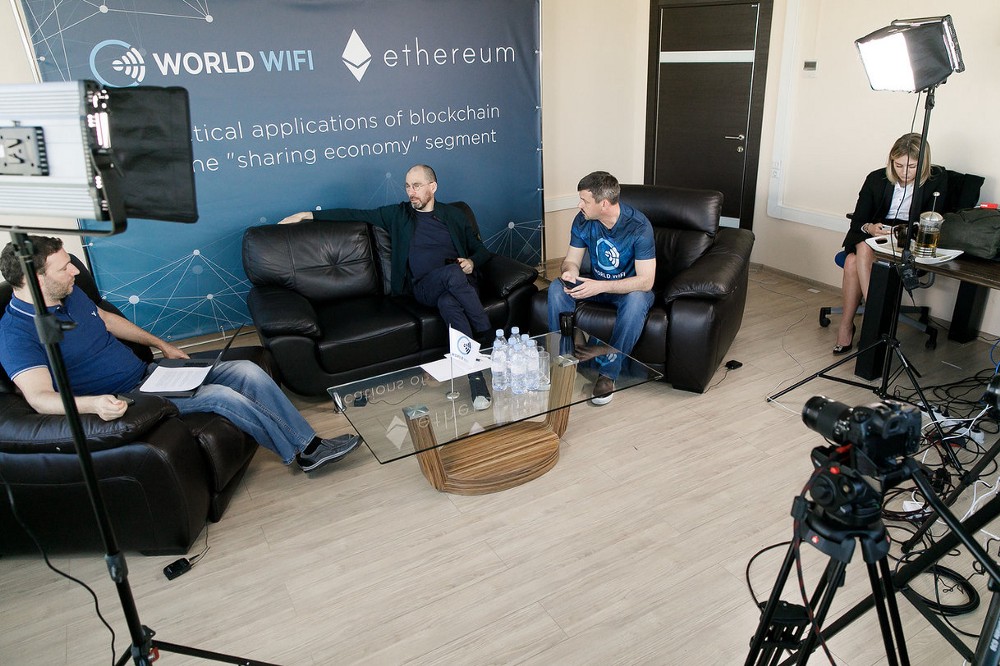
Dmitry Dain: World Wi-Fi does exactly that for telecom equipment, doesn’t it? You create sharing of Wi-Fi routers by removing the need to have under-utilized assets out there?
Ilya Yashin: That’s why I asked about “sharing business” – World Wi-Fi doesn’t just let you share your router, we share our business with our customers. Active customers receive the most part of business income. Our team only takes 5% as a transaction commission. This is a truly decentralized business, not just sharing economy.
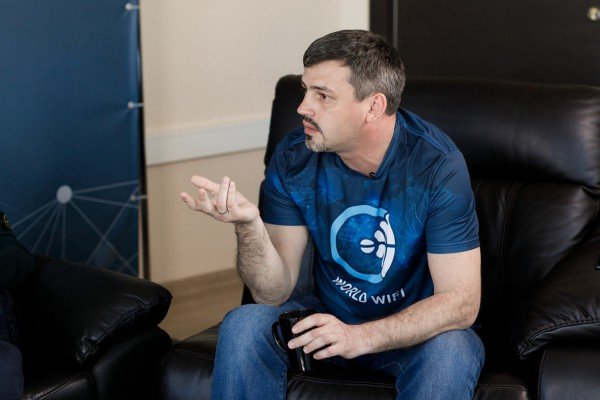
Dmitry Dain: We’ve certainly seen some very profitable sharing economy use cases like Airbnb, but others don’t seem that profitable at the moment. Do think it’s just too early and the future is ahead of them?
Vladislav Martynov: I definitely agree that it’s too early. If you look in the past, there were certainly some disruptive technologies and it took them 5–7 years to become profitable. We’re still at the early stage of blockchain adoption. I think within 2–5 years we will see a lot of interesting businesses in this sphere that are just as profitable, if not more.
Coming back to “sharing business”, I think it’s a great idea that will substantially reduce the gap between business owners and customers. They will be much more dependent on each other and they will have more common interests.
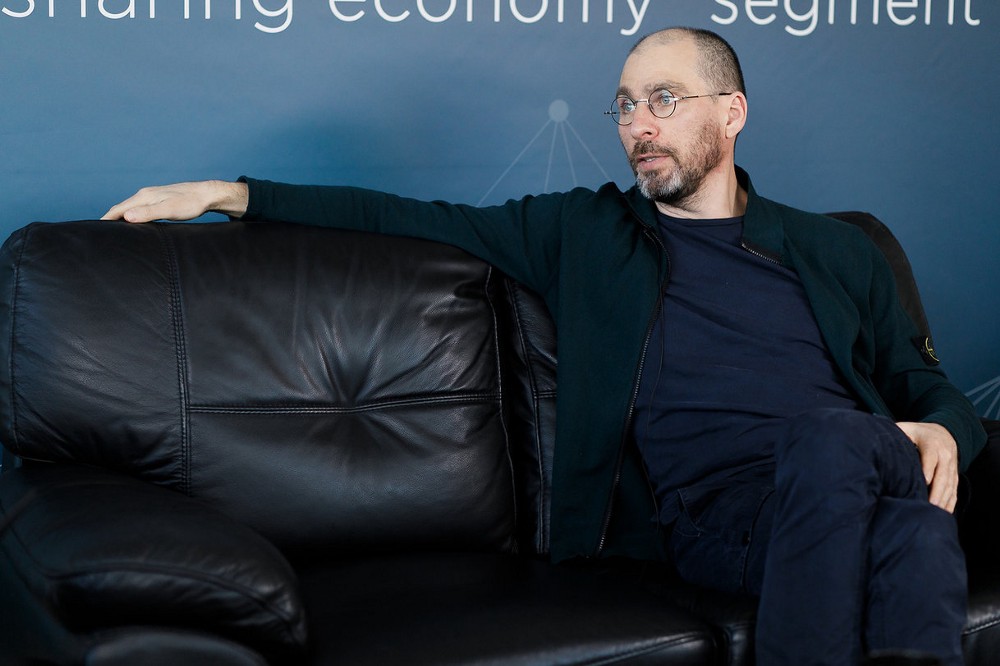
Dmitry Dain: Would it make customers more loyal?
Vladislav Martynov: Absolutely, more loyal, but also more proactive. If they disapprove of something, they won’t leave, they will come back and say “fix it”, because it’s their profits too.
Dmitry Dain: Lets talk about cultural influences on the sharing economy. In some counties blockchain adoption and ICOs skyrocket and in others not so much. What are the reasons for it? Is regulation the problem? Or a solution?
Vladislav Martynov: First wave of ICOs in the past 2 years was very speculative. 90% or more have failed or will fail. I think within a year or two we will see more blockchain startups that will lauch an Alpha or Beta version before the ICO, validate this product with the first set of customers, make sure customers are ready to pay a certain fee for this product, make a better business and financial plan. And then and only then raise money, in a more more regulated and predictable way. Because a year ago it was ‘wild wild west’, very chaotic. That the major change happening now.
Ilya Yashin: We’ve seen a lot of scam ICOs for the past year, and this is probably why it’s harder to conduct one now. Investors can understand what is a scam and what isn’t. But we see little government regulation. Do you think its a self-regulated market?
Vladislav Martynov: Self-regulation is definitely already happening, especially with lots of companies doing scorings, ratings, assessments of ICOs. But we shouldn’t fool ourselves by thinking that the government will leave this story the way it was last year. We already see a substantial push from the government to regulate, formalize and come up with a legal framework for all new things blockchain brings. More will come within 12 months.
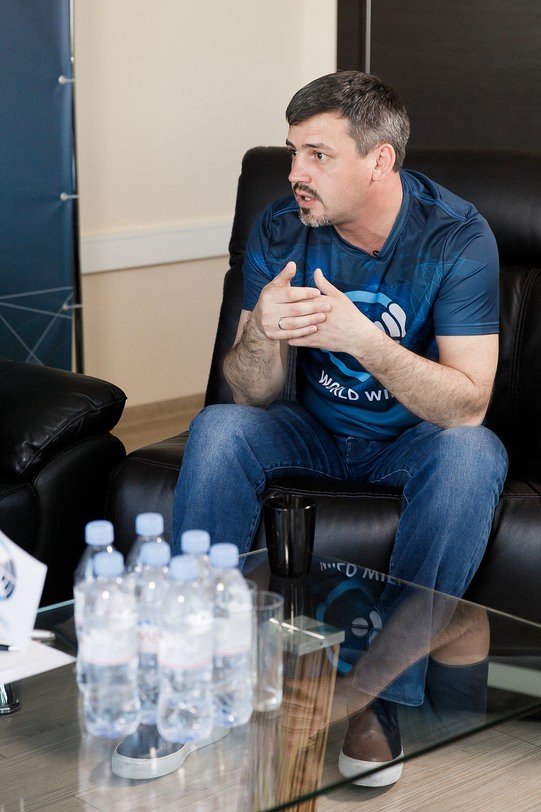
Dmitry Dain: Do you think regulation is going to help ICOs get more contributions?
Vladislav Martynov: Depends on kind of regulation – if it’s too harsh then definitely won’t. Regulation should be well-thought through and balanced, and in this case we’ll see tons of innovation and great projects.
Dmitry Dain: About World Wi-Fi – does it become one of use cases of how blockchain is applied by ordinary people in real life?
Ilya Yashin: Yes, but in our case its possible for the customer not to know he is using blockchain. It’s important for all of us to remember that blockchain is just technology. So many companies want to add blockchain to their processes even though it’s not needed there, they use it as an investment tool because of all the hype around it. This is not the case with us — World Wi-Fi is impossible without blockchain. We can’t use banking or fiat for our transactions, and we need to provide our advertisers with real information on campaigns that can’t be changed or corrupted, and our referral system works on blockchain.
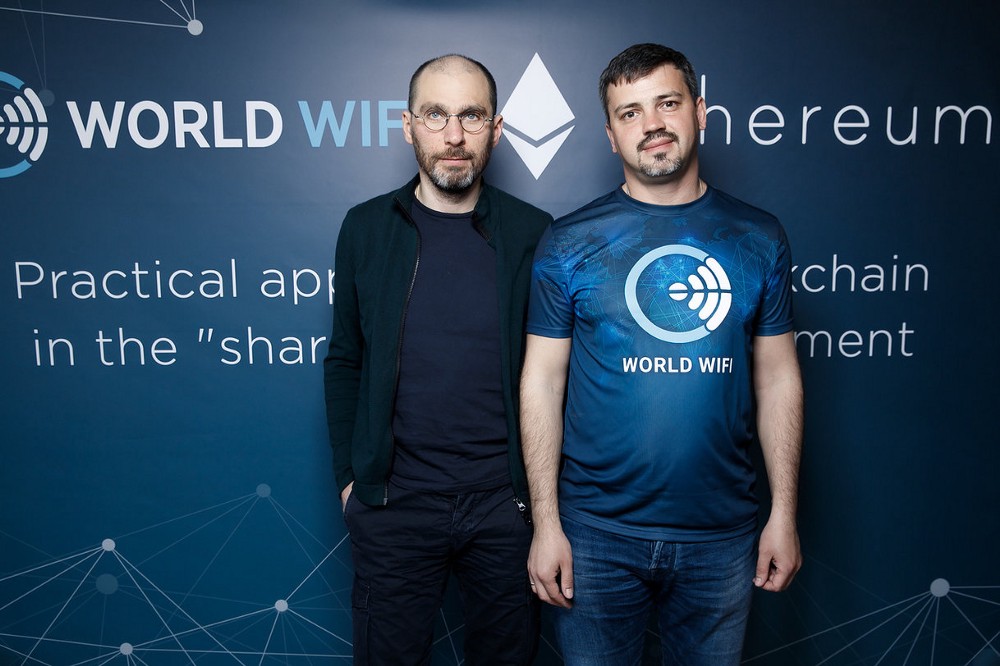
Dmitry Dain: This brings me to a question to Vladislav – for companies like World Wi-Fi, where blockchain is built into everything, there’s an issue with scalability. Is it something that’s solvable, something that won’t be a problem going forward?
Vladislav Martynov: First of all, speed and scalability is not necessary for all applications, there are a lot of projects that run very well with what’s available now. At EdCon in Toronto last week, Ethereum Foundation presented in a very detailed way the latest developments we’ve been working on and how the scalability issue will be solved. The video presentation is publicly available on Youtube.
Coming back to how blockchain is applicable to sharing economy, or any other segments for that matter, I think it’s important that the service is substantially cheaper, easier to use and more secure than the older alternative. And if a startup doesn’t meet these three criteria, I think there’s simply no point in implementing this new technology, in my opinion these projects will not be successful.
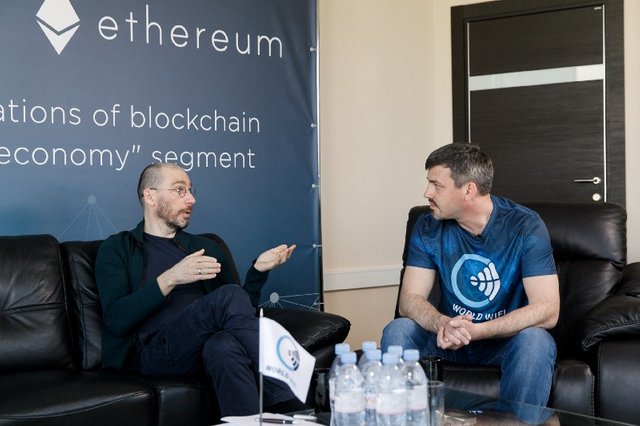
Dmitry Dain: We’re definitely seeing this in the ICO market, there are so many that fail, and mostly because they don’t in fact need blockchain and don’t offer something new that is actually better than before.
Vladislav Martynov: True. For example if you take World Wi-Fi, it’s clear that their business model would not work with conventional banks because their transaction fees would kill the whole economic model of this project.
Dmitry Dain: I’ll refer to the Chairman of Federal Reserve of the United States Bernanke who was in charge when Bitcoin was being legalised in the USA and he said Bitcoin was important for the speed of money through the economy. And I think this is what Ethereum is all about and what World Wi-Fi is taking advantage of – the speed of money movement through a blockchain-powered economy is so much faster and cheaper.
Vladislav Martynov: You’re absolutely right. If you look back, historically we find a new form of money from stones to coin to paper to electronic money, every time the speed increases, creating triggers for economy growth.
Dmitry Dain: Then is it fair to say that in 10 years every company will be powered by blockchain or cease to exist?
Vladislav Martynov: I’m not sure about every single company, but I do believe in 5–10 years blockchain will have mass adoption, in all kinds of human activities, not just businesses – much like the internet and mobile phones.
Dmitry Dain: Coming back to the topic of regulation, do you guys cooperate with the government to implement the technology or are you completely separated?
Vladislav Martynov: The Ethereum Competence Centre interacts with different governments from time to time. It depends on the country, some are trying to understand and realise the potential of blockchain, while others make very fast decisions regarding regulation without attempting to go deeper. But sooner or later we will see a finalized legal framework that is more or less similar in all parts of the globe, in my opinion. Probably with the exception of China and smaller countries, because smaller countries have weaker economies and they may see blockchain as a breakthrough solution, so they might be more friendly towards it.
Ilya Yashin: For us it also depends on the country, because we’re operating worldwide. Some governments need identification for all Wi-Fi users, others don’t, in some countries only telecom companies provide Wi-Fi routers. Our lawyers study the specifics of each country before we enter a new market. It’s important for governments to cooperate with us because slower internet generally means lower economic growth.
Dmitry Dain: Let’s talk about Ethereum and Lightning technologies – are they complementary or competitive?
Vladislav Martynov: Both communities are trying to solve the same problem of speed and scalabitily. I would not call it a competition at this stage, the blockchain market is so new, projects like these usually help each other. All ideas are shared, we’re open source.
Dmitry Dain: Ilya, you’ve just done an ICO based on Ethereum, and you’re very close to reaching the hard cap. Can you please tell us about your experience, how was it?
Ilya Yashin: Doing our ICO on Ethereum made the process very easy and transparent. Smart contracts made working with outsource contractors much safer.
Dmitry Dain: Let’s talk about the state of the ICO market in general. A lot of people ask if it’s worth starting an ICO now?
Vladislav Martynov: Starting an ICO now requires much more work, and I think it’s for good. Collecting tons of money when you just write a piece of paper describing your idea is fundamentally wrong. Investors have become smarter. ICOs should be a way to scale your business after you’ve made an MVP and can show the worthiness of the product.
Ilya Yashin: This is exactly what World Wi-Fi is doing – we have two working businesses with over 14,000 hotspots, and we’re using blockchain to scale. The first business is Radius Wi-Fi, where we sell hotspot solutions to public places like hotels or cafes in over 100 cities. The second is Adrenta, which sells advertisement in these hotspots. They’re currently B2B models, and having to use conventional banking essentially means advertisers’ money gets burned because of all the middlemen. By connecting advertisers and router owners via P2P, we’re able to save advertisers over 40% of their money. We always test each hotspot to know what sells best there, and we provide this information to advertisers, so they have results of previous campaigns and know exactly what works and what doesn’t. We’ve had some amazing results, for example selling mobile games in airports or vegan food deliveries in yoga centres, with conversion rates as high as 6%.
Dmitry Dain: Let’s finish with the hottest topic over the past few weeks. Stable currencies for the crypto market – are they good, are they bad, do they miss the point?
Vladislav Martynov: The reason why people talk about this so much is because Bitcoin and other cryptocurrencies are highly volatile. That means that Bitcoin cannot deliver on the promise to become a currency to pay for services or exchange between people. Particularly for crypto traders who are constantly buying and selling cryptocurrency, it’s easy to convert and fix the profit by converting a certain volatile cryptocurrency into a stable coin. One of the most painful moments now is exchanging cryptocurrency into fiat. So that solves the problem, you can have a cryptocurrency backed by gold or certain commodities and make a quick fixing of the rate. Also certain stable coins serve the need for payments between individuals. High volatility of coins is also one of the main roadblocks holding back mass adoption of blockchain by businesses. As soon as we see a very strong stable coin backed by certain assets in a very transparent way, I think it will be in great demand with enterprises and it will accelerate broader adoption of this technology.
Dmitry Dain: Let’s summarise what we’ve talked about so far in terms of what will help blockchain in general – we’ve talked about use cases, regulation, scalability, stable currencies – that’s a nice roadmap for the market. We’ve also discussed sharing economy and how blockchain is helping it flourish. Thank you everyone!